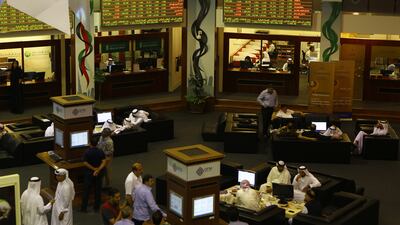Dubai’s main equity index rallied for the third straight session as a rebound in the price of oil continued to boost investor confidence.
Dubai Investments, the biggest publicly traded investment firm in the emirate, and Emirates NBD, Dubai's biggest bank, led the gains.
The DFM General Index increased 2.3 per cent, while the Abu Dhabi Securities Exchange General Index decreased 0.9 per cent. Dubai Investments jumped 8.6 per cent to Dh2.4 while Emirates NBD rose 6.8 per cent to Dh8.8. Brent crude gained as much as 0.5 per cent to US$61.67 a barrel midafternoon UAE time.
In Abu Dhabi, FGB, the biggest bank in the UAE by market value, dropped 2.9 per cent to Dh16.5, while Abu Dhabi Commercial Bank shed 5.3 per cent to Dh7.1.
The three-day, 27 per cent gain for the Dubai index puts it firmly back into a bull market. It had dipped into a bear market last week after the slide in oil prices triggered panic selling. But the rebound in oil prices on Friday, coupled with a rally in US stocks the same day after the Federal Reserve said it was too early to raise interest rates, prompted a come back for Arabian Gulf equities.
A bull market is generally accepted to be when a security or index jumps 20 per cent from a low, and a bear market is the opposite.
“The oil helps, the Fed statement helps, but it’s a relief rally as well and you are still in an extremely volatile environment,” said Simon Kitchen, the Cairo-based chief strategist at the Egyptian investment bank EFG-Hermes.
“There may be a lot of short term traders looking to cash in because they’ve made a lot of money in a very short space of time. As long as the outlook for oil remains unclear, I would expect volatility, coupled with the fact that interest rates will probably rise in 2015 and that money is coming out of emerging markets into developed markets. All of these things point to a higher level of volatility in 2015.”
The UAE is the world’s eighth-biggest oil producer and the federal government funds more than 60 per cent of its budget from crude exports. The drop in oil, which has shed almost 45 per cent of its value this year, comes amid increasing production in countries such as the United States and waning demand amid global economic uncertainty.
Dubai's measure rallied 13 per cent on Thursday, its biggest jump to date, while the ADX surged by 6.7 per cent.
Meanwhile in Saudi Arabia, the world's largest oil exporter, the benchmark stock index Tadawul rose as much as 0.7 per cent. It was reported by local media in Saudi Arabia that the country's budget, eagerly anticipated after the drop in oil prices, would be released later this week.
mkassem@thenational.ae
Follow The National's Business section on Twitter

